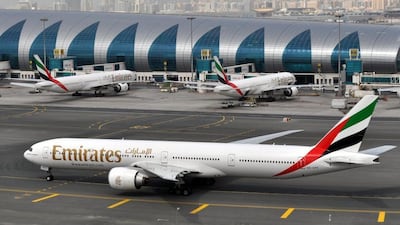Passengers travelling to the United States from Dubai will have to undergo additional security measures, Emirates airline said on Wednesday.
The carrier said it received updated security guidelines from the US government and its flights will be subject to enhanced security screening measures beginning on October 26.
"The new directive requires passenger pre-screening interviews at the check-in counter for originating passengers and at the boarding gate for transfer and transit passengers," Emirates said. "These measures will work with the current additional screening measures conducted at the boarding gate, including those for electronic devices. Passengers should allow additional time to be checked-in and boarded if travelling to the US from Dubai International Airport."
Saj Ahmad, chief analyst at StrategicAero Research in the UK, said pre-screening interviews would most likely include some low-level questioning about people’s travel plans and duration of stay, rather than any formal interrogating.
“It’s likely the questioning would also be about how much money they have, or don’t have, and how they bought their ticket,” he said.
"Other lines of questioning may include details on a person's employment status, whether they are travelling alone or in a group, with family or friends and what the purpose of their travel is for."
Mr Ahmad said the downside would be a knock-on effect in terms of processing passengers, potentially adding to delays.
“So it’s perhaps advisable to get to the airport even earlier to mitigate against that,” he said.
Capt Darren Straker, former Chief Air Accident Investigator at the GCAA in the UAE and independent investigator at Straker System Safety, said security measures should be risk-based, outcome-focused and proportionate to the probable threat.
“There are similar initiatives for US flight pre-screening in other parts of the world,” he said. “The Airline concerns are that the profiling adds additional constraints to the screening and boarding processes and are regionally based.”
He said additional screening was not unusual.
_______________
Read more:
Aircraft laptop ban could have cost Emirates half of its US business, airline president says
Emirates says US flight laptop ban lifted
_______________
"Given the regional geopolitical concerns, these would be risk profile based and although intrusive, are based on generalised assessment criteria."
He said questions were typically about recent travel locations, affiliations to known organisations, reason for travelling to the US and the sourcing and integrity of any electronic devices.
"If assessed as a threat, additional screening can be applied to determine actual risk," Capt Straker added.
Etihad has not received such guidelines and the airline said operations were continuing as usual.
Abu Dhabi International Airport is equipped with a US customs border clearance gate.
Opened in January 2014 as the first of its kind in the Middle East, the gate is manned by US security officers who screen passengers before they board flights to the US, allowing them to bypass long immigration lines at the other end.
“It is likely that with these new rule changes, the likes of Dubai International will probably make a play for a US Pre-Clearance facility of its own like Abu Dhabi International has to help adjust to these new security measures and screening processes to better manage time and be efficient,” said Mr Ahmad.
Katie Spalding, who travels to the US regularly to visit her brother, said that although being interviewed about her trip would be annoying, it would not necessarily put her off flying there.
“I guess it depends on the questions and the length of those interviews,” she said. “I’m just wondering who will be conducting those interviews and what would be expected from them to extract exactly? Will they be intelligence agents or just the standard check-in airline clerks? Are they meant to identify potentially dangerous people or just enter a few answers into a system? And if so, why can’t we just answer these questions through an online form to save time?”
Marc D, who travels to the US at least once a month for work, said the added security measures might not change much for him at first. “It all depends how often I get asked questions,” he said. “It might start becoming a nuisance if it happens every month and I have to go much earlier than expected. Dubai Airport is busy enough as is and I’m not quite sure why they keep coming up with new security measures every few months.”
The US’ former restrictions on carry-on electronic devices on planes included 10 airports in eight countries in the Middle East and North Africa in response to unspecified security threats.
After lifting them in July, the Trump administration said it could reimpose measures on a case by case basis if airlines and airports did not boost security. Officials said at the time that airlines had 120 days to comply with the measures, including increased passenger screening. That deadline ends on October 26 with airlines having until late July to expand explosive trace detection testing.

